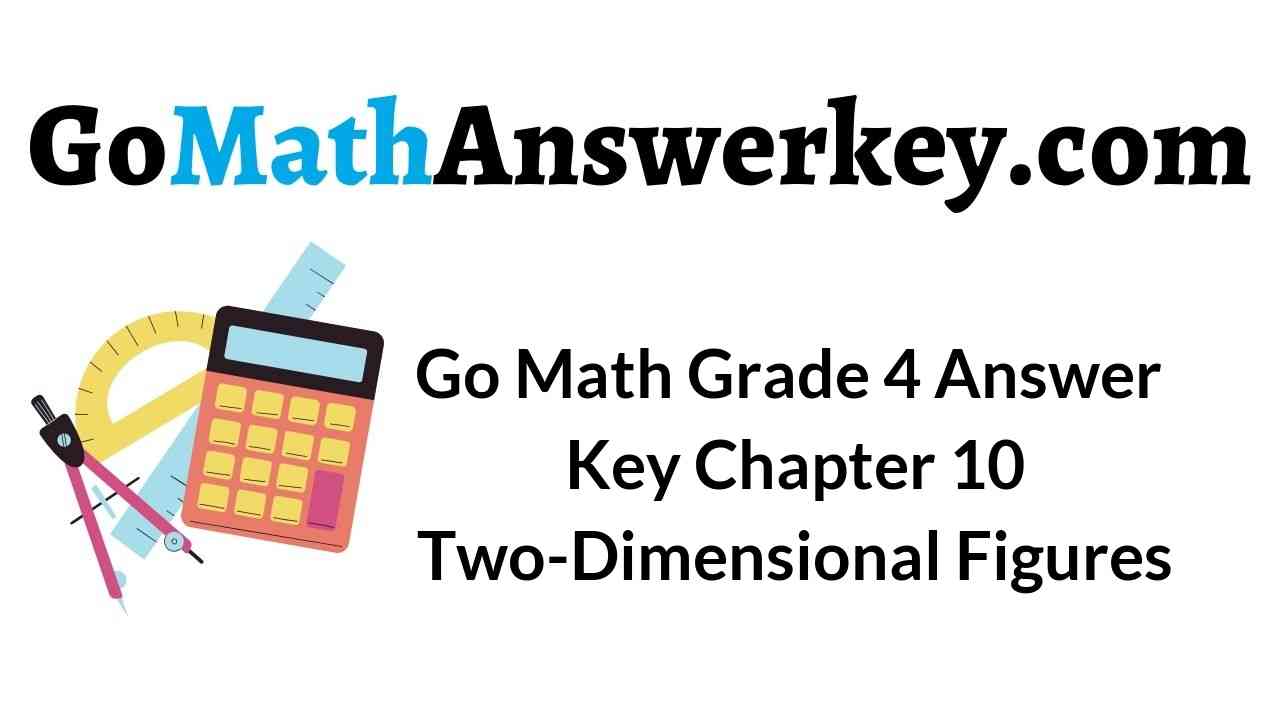Go Math Grade 4 Chapter 10 Answer Key Pdf: You are at the exact location to fins Go Math Grade 4 Answer Key Chapter 10 Two-Dimensional Figures PDF. Download Go Math Grade 4 Chapter 10 Two-Dimensional Figures Answer Key PDF for free and begin your practice. When you keep practicing you will never end to love the maths. So, to get the best way of learning must refer to Go Math Grade 4 Chapter 10 Answer Key. If you are finding the resource to learn and practice Grade 4th math then you reach the correct place. You will find all the resources of Go Math Grade 4 Books and PDF’s here. Get the best learning tips and tricks with the help of the Go Math Grade 4 Answer Key Chapter 10 Two-Dimensional Figures.
Two-Dimensional Figures Go Math Grade 4 Chapter 10 Answer Key Pdf
Best learning will come to your hands if you have the handy Go Math Grade 4 Answer Key Chapter 10 Two-Dimensional Figures PDF. We included questions, answers, and also extra practice questions for students along with explanations. Grow through a daily set of highly focused practice questions present on Go Math Grade 4 Chapter 10 Solution Key. Go Math Grade 4 Answer Key Chapter 10 Two-Dimensional Figures Answer key will give you a clear understanding of problems. Download HMH Go Math Grade 4 PDF now.
Lesson 1: Lines, Rays, and Angles
Lesson 2: Classify Triangles by Angles
- Classify Triangles by Angles – Page No. 557
- Classify Triangles by Angles Lesson Check – Page No. 558
- Classify Triangles by Angles Lesson Check 1 – Page No. 559
- Classify Triangles by Angles Lesson Check 2 – Page No. 560
Lesson 3: Parallel Lines and Perpendicular Lines
- Parallel Lines and Perpendicular Lines – Page No. 563
- Parallel Lines and Perpendicular Lines Lesson Check – Page No. 564
- Parallel Lines and Perpendicular Lines Lesson Check 1 – Page No. 565
- Parallel Lines and Perpendicular Lines Lesson Check 2 – Page No. 566
Lesson 4: Classify Quadrilaterals
- Classify Quadrilaterals – Page No. 569
- Classify Quadrilaterals Lesson Check – Page No. 570
- Classify Quadrilaterals Lesson Check 1 – Page No. 571
- Classify Quadrilaterals Lesson Check 2 – Page No. 572
Mid-Chapter Checkpoint
Lesson 5: Line Symmetry
- Line Symmetry – Page No. 577
- Line Symmetry Lesson Check – Page No. 578
- Line Symmetry Lesson Check 1 – Page No. 579
- Line Symmetry Lesson Check 2 – Page No. 580
Lesson 6: Find and Draw Lines of Symmetry
- Find and Draw Lines of Symmetry – Page No. 583
- Find and Draw Lines of Symmetry Lesson Check – Page No. 584
- Find and Draw Lines of Symmetry Lesson Check 1 – Page No. 585
- Find and Draw Lines of Symmetry Lesson Check 2 – Page No. 586
Lesson 7: Problem Solving • Shape Patterns
- Shape Patterns – Page No. 589
- Shape Patterns Lesson Check – Page No. 590
- Shape Patterns Lesson Check 1 – Page No. 591
- Shape Patterns Lesson Check 2 – Page No. 592
- Shape Patterns Lesson Check 3 – Page No. 593
Review/Test
- Review/Test – Page No. 594
- Review/Test – Page No. 595
- Review/Test – Page No. 596
- Review/Test – Page No. 597
- Review/Test – Page No. 598
- Review/Test – Page No. 603
- Review/Test – Page No. 604
Common Core – New – Page No. 553
Lines, Rays, and Angles
Draw and label an example of the figure.
Question 1.
obtuse ∠ABC
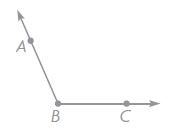
Think: An obtuse angle is greater than a right angle. The middle letter, B, names the vertex of the angle.
_________
Answer:
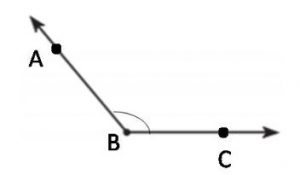
Explanation:
An obtuse angle is greater than a right angle. The middle letter, B, names the vertex of the angle.
Question 2.
\(\overrightarrow{G H}\)
_________
Answer:
![]()
Explanation:
GH is a ray that has one endpoint and continues without an end in one direction.
Question 3.
acute ∠JKL
_________
Answer:
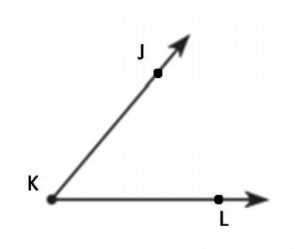
Explanation:
Angle JKL is an acute angle that is less than a right angle.
Question 4.
\(\overline{B C}\)
Answer:

Explanation:
BC is a line that continues without an end in both directions.
Use the figure for 5–8.
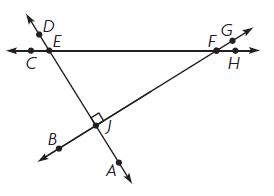
Question 5.
Name a line segment.
Answer:
line segment EF
Explanation:
EF line is a straight path of points that continues without an end in both directions.
Question 6.
Name a right angle.
∠ _____
Answer:
∠EJF
Explanation:
EJF is a right angle that forms a square corner.
Question 7.
Name an obtuse angle.
obtuse ∠ _____
Answer:
∠CEJ
Explanation:
CEJ is an obtuse angle that is greater than a right angle.
Question 8.
Name a ray.
Answer:
Ray JD
Explanation:
JD is a ray that has one endpoint and continues without an end in one direction.
Problem Solving
Use the figure at the right for 9–11.
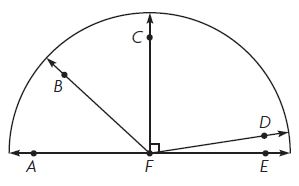
Question 9.
Classify ∠AFD
_________
Answer:
Obtuse Angle
Explanation:
AFD is an obtuse angle that is greater than a right angle.
Question 10.
Classify ∠CFE.
_________
Answer:
Right Angle
Explanation:
∠CFE is a right angle that forms a square corner.
Question 11.
Name two acute angles.
acute ∠ _____ acute ∠ _____
Answer:
∠AFB and ∠DFE
Explanation:
∠AFB and ∠DFE are two acute angles with less than a right angle.
Common Core – New – Page No. 554
Lesson Check
Question 1.
The hands of a clock show the time 12:25.
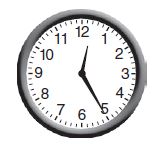
Which best describes the angle between the hands of the clock?
Options:
a. acute
b. right
c. obtuse
d. straight
Answer:
c. obtuse
Explanation:
The hands of the time 12:25 are forming greater than a right angle. So, the answer is the Obtuse angle.
Question 2.
Which of the following name two different figures?
Options:
a. \(\overline{A B} \text { and } \overline{B A}\)
b. \(\stackrel{\longleftrightarrow}{A B}\) and \(\stackrel{\longleftrightarrow}{B A}\)
c. \(\overrightarrow{A B} \text { and } \overrightarrow{B A}\)
d. ∠ABC and ∠CBA
Answer:
c. \(\overrightarrow{A B} \text { and } \overrightarrow{B A}\)
Explanation:
In \(\overrightarrow{A B}\), A is an end point and B continues without end in one direction.
In \(\overrightarrow{B A}\), B is an end point and A continues without an end in one direction.
Spiral Review
Question 3.
Jan’s pencil is 8.5 cm long. Ted’s pencil is longer. Which could be the length of Ted’s pencil?
Options:
a. 0.09 cm
b. 0.8 cm
c. 8.4 cm
d. 9.0 cm
Answer:
d. 9.0 cm
Explanation:
9 ones is greater than 8 ones. So, 9.0 cm > 8.5 cm
Question 4.
Kayla buys a shirt for $8.19. She pays with a $10 bill. How much change should she receive?
Options:
a. $1.81
b. $1.89
c. $2.19
d. $2.81
Answer:
a. $1.81
Explanation:
Kayla buys a shirt for $8.19. She pays with a $10 bill. To find the change she received, $10 – $8.19 = 1.81
Question 5.
Sasha donated \(\frac{9}{100}\) of her class’s entire can collection for the food drive. Which decimal is equivalent to \(\frac{9}{100}\) ?
Options:
a. 9
b. 0.99
c. 0.9
d. 0.09
Answer:
d. 0.09
Explanation:
\(\frac{9}{100}\) is 9 hundredths. So, the decimal is 0.09.
Question 6.
Jose jumped 8 \(\frac{1}{3}\) feet. This was 2 \(\frac{2}{3}\) feet farther than Lila jumped. How far did Lila jump?
Options:
a. 5 \(\frac{1}{3}\)
b. 5 \(\frac{2}{3}\)
c. 6 \(\frac{1}{3}\)
d. 11
Answer:
b. 5 \(\frac{2}{3}\)
Explanation:
Jose jumped 8 \(\frac{1}{3}\) feet. This was 2 \(\frac{2}{3}\) feet farther than Lila jumped.
8 \(\frac{1}{3}\) – 2 \(\frac{2}{3}\) = \(\frac{25}{3}\) – \(\frac{8}{3}\) = \(\frac{7}{3}\) = 5 \(\frac{2}{3}\)
Page No. 557
Question 1.
Name the triangle. Tell whether each angle is acute, right, or obtuse.
A name for the triangle is __________ .

Name:
∠F is _________
∠G is _________
∠H is _________
Answer:
Right Triangle; Triangle FGH;
∠F and ∠H are acute angles.
∠G is Right angle
Explanation:
∠F and ∠H are acute angles with less than a right angle. ∠G is the Right angle that forms a square corner. A triangle that has one right angle is called a right triangle.
Classify each triangle. Write acute, right, or obtuse.
Question 2.
![]()
_____
Answer:
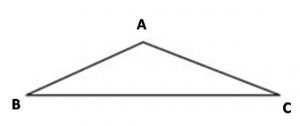
Obtuse triangle;
Angle B and Angle C are both acute.
Angle A is obtuse.
Explanation:
From triangle ABC, Angle B, and Angle C are both acute with less than a right angle. Angle A is obtuse angle that is greater than a right angle.
Question 3.

_____
Answer:
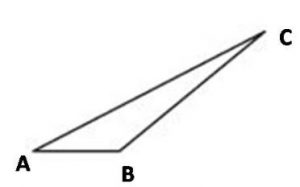
Obtuse triangle;
Angle A and Angle C are both acute.
Angle B is obtuse.
Explanation:
From triangle ABC, Angle A, and Angle C are both acute with less than a right angle. Angle B is an obtuse angle that is greater than a right angle. A triangle with an obtuse angle is called an obtuse triangle.
Question 4.
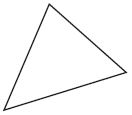
_____
Answer:
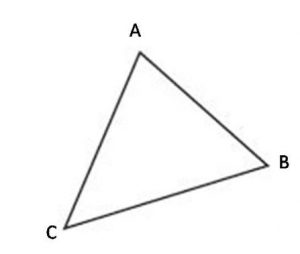
Acute triangle;
Angle A, Angle B, and Angle C are acute angles.
Explanation:
From triangle ABC, Angle A, Angle B, and Angle C are acute angles with less than a right angle. A triangle with three acute angles called an acute triangle. So, the given triangle is an acute triangle.
Question 5.

_____
Answer:
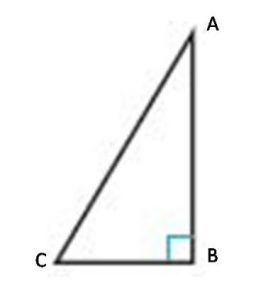
Right Triangle; Triangle ABC;
∠A and ∠C are acute angles.
∠B is Right angle
Explanation:
∠A and ∠C are acute angles with less than a right angle. ∠B is the Right angle that forms a square corner. A triangle that has one right angle is called a right triangle.
Question 6.

_____
Answer:
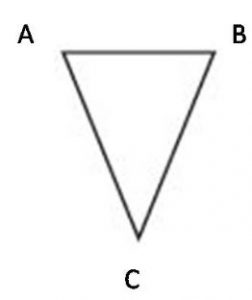
Acute triangle;
Angle A, Angle B, and Angle C are acute angles.
Explanation:
From triangle ABC, Angle A, Angle B, and Angle C are acute angles with less than a right angle. A triangle with three acute angles called an acute triangle. So, the given triangle is an acute triangle.
Question 7.

_____
Answer:
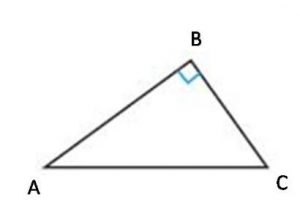
Right Triangle;
∠A and ∠C are acute angles.
∠B is Right angle
Explanation:
∠A and ∠C are acute angles with less than a right angle. ∠B is the Right angle that forms a square corner. A triangle that has one right angle is called a right triangle.
Question 8.
Cross out the figure that does not belong. Explain.

Type below:
_________
Answer:
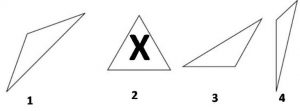
Explanation:
From the given image, 1, 3, and 4 have two acute angles, and one obtuse angle. 2 have three acute angles.
Page No. 558
Use the Venn diagram for 9–10.
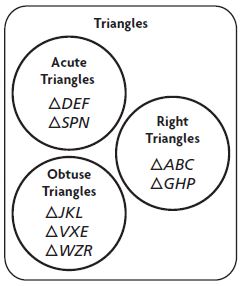
Question 9.
Which triangles do NOT have an obtuse angle? Explain.
_______ triangles
Answer:
4 triangles;
Triangle DEF, Triangle SPN, Triangle ABC, and Triangle GHP are don’t have an obtuse angle. Triangle DEF, Triangle SPN are acute angles. An acute triangle is a triangle with three acute angles. Triangle ABC, and Triangle GHP are right angles. A right triangle is a triangle with one right angle. The sum of the triangle is 180 degrees. A right triangle has 90 degrees. So, the remaining angles must be acute angles.
Question 10.
How many triangles have at least two acute angles? Explain.
_______ triangles
Answer:
4 triangles;
Triangle DEF, Triangle SPN, Triangle ABC, and Triangle GHP at least two acute angles. Triangle DEF, Triangle SPN are acute angles. An acute triangle is a triangle with three acute angles. Triangle ABC, and Triangle GHP are right angles. A right triangle is a triangle with one right angle and two acute angles.
Question 11.
Use the square shown at the right. Draw a line segment from point M to point P. Name and classify the triangles formed by the line segment.
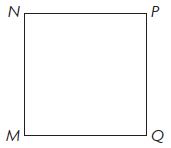
Type below:
_________
Answer:
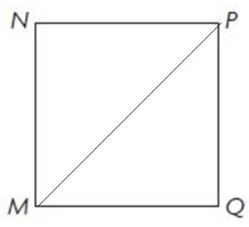
Angle MNP and Angle MQP
Explanation:
The line segment from M to P forms Angle MNP and Angle MQP.
Question 12.
Write the letter of the triangle under its correct classification.
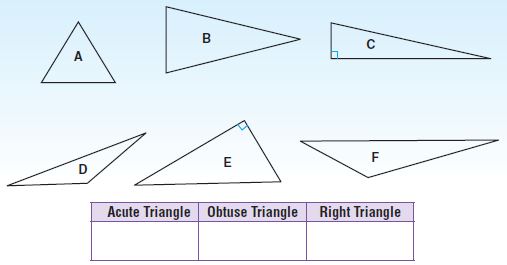
Type below:
_________
Answer:

Explanation:
Triangle A and triangle B have three acute angles. So, they are acute triangles. Triangle D and triangle F have one obtuse angle. So, they are obtuse triangles.
Triangle C and triangle E have one right angle. So, they are right triangles.
Common Core – New – Page No. 559
Classify Triangles
Classify each triangle. Write acute, right, or obtuse.
Question 1.
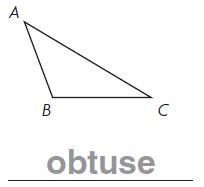
Think: Angles A and C are both acute.
Angle B is obtuse.
Answer:
Obtuse triangle;
Angle A and Angle C are both acute.
Angle B is obtuse.
Explanation:
From triangle ABC, Angle A, and Angle C are both acute with less than a right angle. Angle B is an obtuse angle that is greater than a right angle.
Question 2.
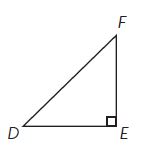
_________
Answer:
Right Triangle; Triangle DEF;
∠D and ∠F are acute angles.
∠E is Right angle
Explanation:
∠D and ∠F are acute angles with less than a right angle. ∠E is the Right angle that forms a square corner. A triangle that has one right angle is called a right triangle.
Question 3.
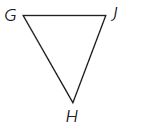
_________
Answer:
Acute triangle;
Angle G, Angle J, and Angle H are acute angles.
Explanation:
From triangle GJH, Angle G, Angle J, and Angle H are acute angles with less than a right angle. A triangle with three acute angles called an acute triangle. So, the given triangle is an acute triangle.
Question 4.
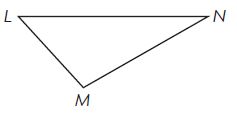
_________
Answer:
Obtuse triangle;
Angle L and Angle N are both acute.
Angle M is obtuse.
Explanation:
From triangle LMN, Angle L and Angle N are both acute with less than a right angle. Angle M is an obtuse angle that is greater than a right angle. A triangle with an obtuse angle is called an obtuse triangle.
Problem Solving
Question 5.
Use figure ABCD below. Draw a line segment from point B to point D. Name and classify the triangles formed.
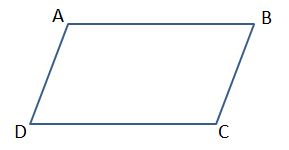
Two _________ triangles
△ _________
△ _________
Answer:
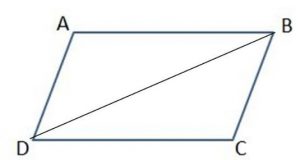
Two Acute triangles.
△ ABD
△ BCD
Explanation:
If we draw a line segment from point B to point D, then there are two traingles formed with less than right angles. They are △ ABD and △ BCD.
Question 6.
Use figure ABCD below. Draw a line segment from point A to point C. Name and classify the triangles formed.
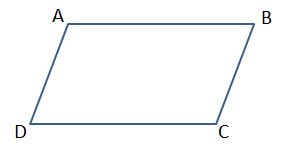
Two _________ triangles
△ _________
△ _________
Answer:
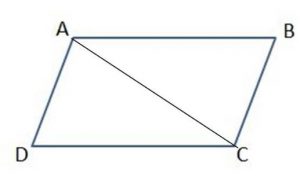
Two Acute triangles.
△ ABC
△ ADC
Explanation:
If we draw a line segment from point A to point C, then there are two traingles formed with less than right angles. They are △ ABC and △ ADC.
Common Core – New – Page No. 560
Lesson Check
Question 1.
Stephen drew this triangle. How many obtuse angles does the triangle have?
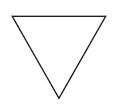
Options:
a. 0
b. 1
c. 2
d. 3
Answer:
a. 0
Explanation:
The given image has three acute angles. So, there are 0 obtuse angles.
Question 2.
Joan was asked to draw a right triangle. How many right angles are in a right triangle?
Options:
a. 0
b. 1
c. 2
d. 3
Answer:
b. 1
Explanation:
A right triangle has only one right angle.
Spiral Review
Question 3.
Oliver drew the figure below to show light traveling from the sun to Earth. Name the figure he drew.
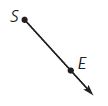
Options:
a. segment SE
b. ray SE
c. line SE
d. ray ES
Answer:
b. ray SE
Explanation:
SE is a ray that has one endpoint and continues without an end in one direction.
Question 4.
Armon added \(\frac{1}{10}\) and \(\frac{8}{100}\). Which is the correct sum?
Options:
a. \(\frac{18}{10}\)
b. \(\frac{9}{10}\)
c. \(\frac{9}{100}\)
d. \(\frac{18}{100}\)
Answer:
d. \(\frac{18}{100}\)
Explanation:
\(\frac{1 X 10}{10 X 10}\) + \(\frac{8}{100}\) = \(\frac{10}{100}\) + \(\frac{8}{100}\) = \(\frac{18}{100}\)
Question 5.
Sam counted out loud by 6s. Jorge counted out loud by 8s. What are the first three numbers both students said?
Options:
a. 8, 16, 24
b. 14, 28, 42
c. 24, 48, 72
d. 48, 96, 144
Answer:
c. 24, 48, 72
Explanation:
Sam counted out loud by 6s = 6, 12, 18, 24, 30, 36, 42, 48, 54, 60, 66, 72.
Jorge counted out loud by 8s = 8, 16, 24, 32, 40, 48, 56, 64, 72, 80.
Both students said the first three numbers are 24, 48, 72.
Question 6.
A basketball team averaged 105 points per game. How many points did the team score in 6 games?
Options:
a. 605 points
b. 630 points
c. 900 points
d. 6,030 points
Answer:
b. 630 points
Explanation:
A basketball team averaged 105 points per game.
They score in 6 games = 6 x 105 = 630 points.
Page No. 563
Question 1.
Draw and label \(\overline{Q R} \| \overline{S T}\).
Think: Parallel lines never intersect. Parallel line segments are parts of parallel lines.
Type below:
_________
Answer:
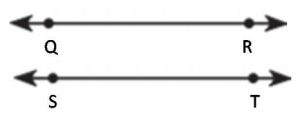
\(\overline{Q R} \| \overline{S T}\)
Explanation:
Parallel lines never intersect. Parallel line segments are parts of parallel lines.
Use the figure for 2 and 3.
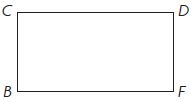
Question 2.
Name two line segments that appear to be parallel.
Type below:
_________
Answer:
Line Segment CB and Line Segment DF.
Explanation:
Line Segment CB and Line Segment DF are parallel lines. The both lines never intersect and are always the same distance apart.
Question 3.
Name two line segments that appear to be perpendicular.
Type below:
_________
Answer:
Line Segment CB and Line Segment BF are perpendicular lines.
Explanation:
Line Segment CB and Line Segment DF are perpendicular lines. Both lines intersect to form four right angles.
Use the figure for 4–5.
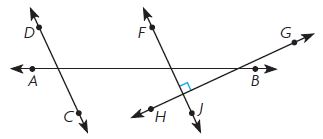
Question 4.
Name a pair of lines that are perpendicular.
Type below:
_________
Answer:
FJ and HG are perpendicular lines.
Explanation:
FJ and HG lines intersect each other and form four right angles.
Question 5.
Name a pair of lines that appear to be parallel.
Type below:
_________
Answer:
DC and FJ are parallel lines.
Explanation:
DC and FJ are never intersected and are always the same distance apart.
Question 6.
\(\overline{R S} \| \overline{T U}\)
Type below:
_________
Answer:
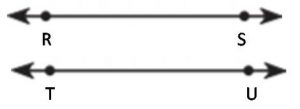
\(\overline{R S} \| \overline{T U}\)
Explanation:
Parallel lines never intersect. Parallel line segments are parts of parallel lines.
Question 7.
\(\overrightarrow{K L} \text { and } \overrightarrow{K M}\)
Type below:
_________
Answer:
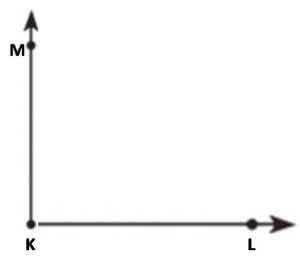
Explanation:
KL and KM are two rays and start at the same point K.
Question 8.
\(\overline{C D} \perp \overline{D E}\)
Type below:
_________
Answer:
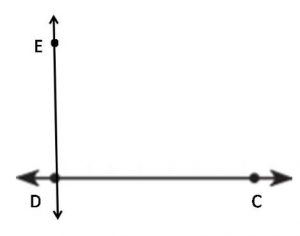
\(\overline{C D} \perp \overline{D E}\)
Explanation:
\(\overline{C D} \perp \overline{D E}\) are two lines. They are intersect each other and form four right angles.
Question 9.
\(\overset { \longleftrightarrow }{ JK } \) ⊥ \(\overset { \longleftrightarrow }{ LM } \)
Type below:
_________
Answer:
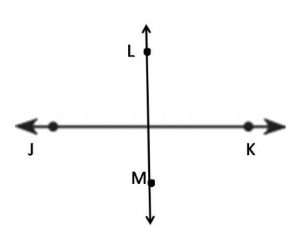
\(\overset { \longleftrightarrow }{ JK } \) ⊥ \(\overset { \longleftrightarrow }{ LM } \)
Explanation:
JK and LM are two lines and intersected each other to form right angles.
Question 10.
\(\overset { \longleftrightarrow }{ ST } \) intersecting \(\overset { \longleftrightarrow }{ UV } \) at point X
Type below:
_________
Answer:
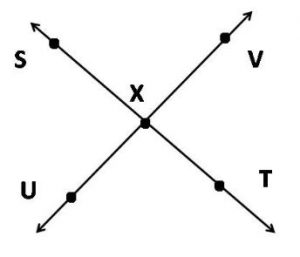
Explanation:
ST and UV are two lines intersecting at point X.
Question 11.
\(\overset { \longleftrightarrow }{ AB } \) || \(\overset { \longleftrightarrow }{ FG } \)
Type below:
_________
Answer:
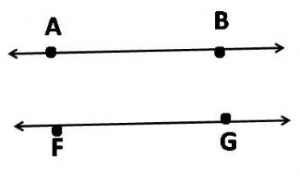
\(\overset { \longleftrightarrow }{ AB } \) || \(\overset { \longleftrightarrow }{ FG } \)
Explanation:
Parallel lines never intersect. Parallel line segments are parts of parallel lines.
Use the figure for 12–13.
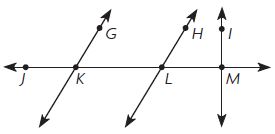
Question 12.
Dan says that \(\overset { \longleftrightarrow }{ HL } \) is parallel to \(\overset { \longleftrightarrow }{ IM } \). Is Dan correct? Explain.
_____
Answer:
No; HL and IM are not parallel lines. Parallel lines are always the same distance apart. But from the given image, the H and I may intersect if the line is extended.
Question 13.
Name two intersecting line segments that are not perpendicular.
Type below:
_________
Answer:
JM and KG are two intersecting line segments and also not perpendicular.
Page No. 564
Use the house plan at the right for 14–16.
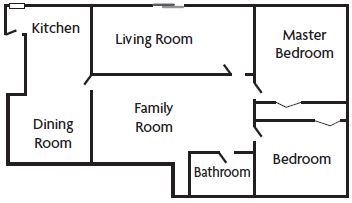
Question 14.
What geometric term describes a corner of the living room?
_________
Answer:
The corner of the living room is a vertex. Corners of any shape are vertexes.
Question 15.
Name three parts of the plan that show line segments.
_________
Answer:
Kitchen, Living Room, and Master Bedroom.
Question 16.
Name a pair of line segments that appear to be parallel
_________
Answer:
Two sidelines of Living Room are parallel.
Two sidelines of Master Bedroom are parallel.
Use the map at the right for 17–19.
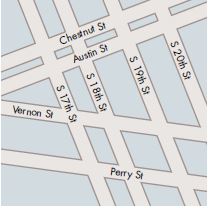
Question 17.
Name a street that appears to be parallel to S 17th Street.
_________
Answer:
S 18th Street
Explanation:
S 18th Street is parallel to S 17th Street. They never meet each other and are always the same distance apart.
Question 18.
Use Diagrams Name a street that appears to be parallel to Vernon Street.
_________
Answer:
Perry Street
Explanation:
Perry Street is parallel to Vernon Street. They never meet each other and are always the same distance apart.
Question 19.
Name a street that appears to be perpendicular to S 19th Street.
_________
Answer:
Austin Street
Explanation:
Austin Street is perpendicular to S 19th Street. They are intersect with each other and form four right angles.
Question 20.
Choose the labels to make a true statement.
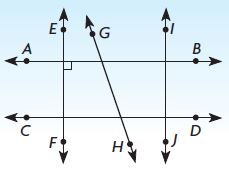
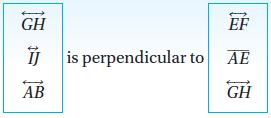
Type below:
_________
Answer:
Line AB is perpendicular to Line EF.
Common Core – New – Page No. 565
Parallel Lines and Perpendicular Lines
Use the figure for 1–3.
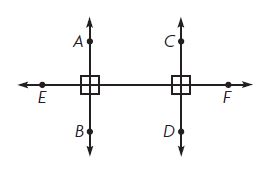
Question 1.
Name a pair of lines that appear to be perpendicular.
Think: Perpendicular lines form right angles.
\(\overset { \longleftrightarrow }{ AB } \) and \(\overset { \longleftrightarrow }{ EF } \) appear to form right angles.
\(\overset { \longleftrightarrow }{ AB } \) and \(\overset { \longleftrightarrow }{ EF } \)
Answer:
\(\overset { \longleftrightarrow }{ AB } \) and \(\overset { \longleftrightarrow }{ EF } \)
Explanation:
Perpendicular lines form right angles.
\(\overset { \longleftrightarrow }{ AB } \) and \(\overset { \longleftrightarrow }{ EF } \) appear to form right angles.
\(\overset { \longleftrightarrow }{ AB } \) and \(\overset { \longleftrightarrow }{ EF } \)
Question 2.
Name a pair of lines that appear to be parallel.
_____ and _____
Answer:
\(\overset { \longleftrightarrow }{ AB } \) and \(\overset { \longleftrightarrow }{ CD} \)
Explanation:
Parallel lines never interest each other. \(\overset { \longleftrightarrow }{ AB } \) and \(\overset { \longleftrightarrow }{ CD} \) are parallel lines.
Question 3.
Name another pair of lines that appear to be perpendicular.
_____ and _____
Answer:
\(\overset { \longleftrightarrow }{ CD } \) and \(\overset { \longleftrightarrow }{ EF } \)
Explanation:
Perpendicular lines form right angles.
\(\overset { \longleftrightarrow }{ CD } \) and \(\overset { \longleftrightarrow }{ EF } \) appear to form right angles.
\(\overset { \longleftrightarrow }{ CD } \) and \(\overset { \longleftrightarrow }{ EF } \)
Draw and label the figure described.
Question 4.
\(\overset { \longleftrightarrow }{ MN } \) and \(\overset { \longleftrightarrow }{ PQ } \) intersecting at point R
Answer:
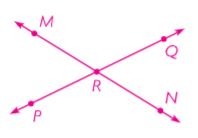
Explanation:
MN and PQ are two lines and interesting at point R.
Question 5.
\(\overset { \longleftrightarrow }{ WX } \) || \(\overset { \longleftrightarrow }{ YZ } \)
Answer:
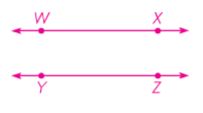
Explanation:
WX and YZ are parallel lines and they never intersect with each other.
Question 6.
\(\overset { \longleftrightarrow }{ FH } \) ⊥ \(\overset { \longleftrightarrow }{ JK } \)
Answer:
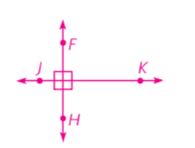
Explanation:
FH and JK are two lines and intersecting each other to form four right angles.
Problem Solving
Use the street map for 7–8.
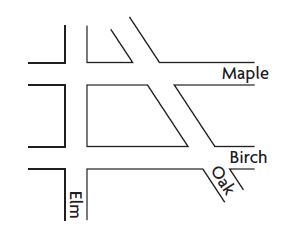
Question 7.
Name two streets that intersect but do not appear to be perpendicular.
Type below:
_________
Answer:
Maple and Oak or Oak and Birch
Explanation:
Maple and Oak or Oak and Birch; They are intersecting with each other and not perpendicular.
Question 8.
Name two streets that appear to be parallel to each other.
Type below:
_________
Answer:
Maple and Birch
Explanation:
Maple and Birch are streets and not intersect with each other. They appear to be parallel to each other.
Common Core – New – Page No. 566
Lesson Check
Question 1.
Which capital letter appears to have perpendicular line segments?
Options:
a. N
b. O
c. T
d. V
Answer:
c. T
Explanation:
T has two lines and interesting to form four right angles.
Question 2.
In the figure, which pair of line segments appear to be parallel?
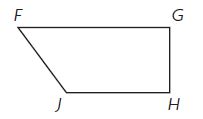
Options:
a. \(\overline{F G} \text { and } \overline{G H}\)
b. \(\overline{F J} \text { and } \overline{G H}\)
c. \(\overline{F G} \text { and } \overline{J H}\)
d. \(\overline{J H} \text { and } \overline{F J}\)
Answer:
c. \(\overline{F G} \text { and } \overline{J H}\)
Explanation:
\(\overline{F G} \text { and } \overline{J H}\) are parallel lines that never intersect
Spiral Review
Question 3.
Nolan drew a right triangle. How many acute angles did he draw?
Options:
a. 0
b. 1
c. 2
d. 3
Answer:
c. 2
Explanation:
A triangle with one right angle will have two acute angles.
Question 4.
Mike drank more than half the juice in his glass. What fraction of the juice could Mike have drunk?
Options:
a. \(\frac{1}{3}\)
b. \(\frac{2}{5}\)
c. \(\frac{3}{6}\)
d. \(\frac{5}{8}\)
Answer:
d. \(\frac{5}{8}\)
Explanation:
Mike drank more than half the juice in his glass. He drunk \(\frac{5}{8}\) of the juice.
Question 5.
A school principal ordered 1,000 pencils. He gave an equal number to each of 7 teachers until he had given out as many as possible. How many pencils were left?
Options:
a. 2
b. 4
c. 6
d. 142
Answer:
c. 6
Explanation:
A school principal ordered 1,000 pencils. He gave an equal number to each of 7 teachers until he had given out as many as possible. He shared 142 pencils for each of 7 teachers. So, 142 X 7 = 994. The remaining pencils are 6.
Question 6.
A carton of juice contains 64 ounces. Ms. Wilson bought 6 cartons of juice. How many ounces of juice did she buy?
Options:
a. 364 ounces
b. 370 ounces
c. 384 ounces
d. 402 ounces
Answer:
c. 384 ounces
Explanation:
A carton of juice contains 64 ounces. Ms. Wilson bought 6 cartons of juice. 64 X 6 = 384 ounces juice she can buy.
Page No. 569
Question 1.
Tell whether the quadrilateral is also a trapezoid, parallelogram, rhombus, rectangle, or square.

Think:
____ pairs of parallel sides
____ sides of equal length
____ right angles
Quadrilateral ABCD is also a __________
__________
Answer:
2 pairs of parallel sides
4 sides of equal length
0 right angles.
Quadrilateral ABCD is also a Rhombus
Explanation:
A Rhombus is a quadrilateral that has 2 pairs of parallel sides and 4 sides of equal lengths.
Classify each figure as many ways as possible. Write quadrilateral, trapezoid, parallelogram, rhombus, rectangle, or square.
Question 2.

__________
Answer:
Quadrilateral
Explanation:
0 pairs of parallel sides
0 sides of equal length
0 right angles.
The given image is quadrilateral.
The quadrilateral doesn’t have a name because it has 0 pairs of parallel sides, 0 sides of equal length, and 0 right angles.
Question 3.

_________
_________
_________
Answer:
Quadrilateral, Rectangle, and Parallelogram
Explanation:
2 pairs of parallel sides
2 pairs of sides of equal length
4 right angles.
Given quadrilateral is Rectangle and Parallelogram.
A Rectangle is a quadrilateral that has 2 pairs of parallel sides and 2 pairs of sides of equal lengths, and 4 right angles.
Question 4.

_________
_________
_________
Answer:
Quadrilateral, Parallelogram, and Rhombus
Explanation:
2 pairs of parallel sides
4 sides of equal length
0 right angles.
Given quadrilateral is Rhombus and Parallelogram.
A Rhombus is a quadrilateral that has 2 pairs of parallel sides and 4 sides of equal lengths, and 0 right angles.
Question 5.

_________
_________
Answer:
Quadrilateral and Parallelogram
Explanation:
2 pairs of parallel sides
2 pairs of sides of equal length
0 right angles.
Given quadrilateral is Parallelogram.
A Parallelogram is a quadrilateral that has 2 pairs of parallel sides and 2 pairs of sides of equal lengths, and 0 right angles.
Question 6.
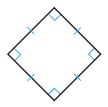
_________
_________
_________
Answer:
Quadrilateral and Square
Explanation:
2 pairs of parallel sides
4 sides of equal length
4 right angles.
Given quadrilateral is Square.
A Square is a quadrilateral that has 2 pairs of parallel sides and 4 sides of equal lengths, and 4 right angles.
Question 7.

_________
_________
Answer:
Quadrilateral and Trapezoid
Explanation:
1 pair of parallel sides
0 sides of equal length
0 right angles.
Given quadrilateral is Trapezoid.
A Square is a quadrilateral that has 1 pair of parallel sides and 0 sides of equal lengths, and 0 right angles.
Page No. 570
Question 8.
Explain how a rhombus and square are alike, and how they are different.
Type below:
_________
Answer:
The rhombus and square have 2 pairs of parallel sides and 4 sides of equal length. But the rhombus has 0 right angles and the square has 4 right angles.
Question 9.
Classify the figure. Select all that apply.

Options:
a. quadrilateral
b. trapezoid
c. parallelogram
d. rectangle
e. rhombus
f. square
Answer:
a. quadrilateral
b. trapezoid
c. parallelogram
Explanation:
A Parallelogram is a quadrilateral that has 2 pairs of parallel sides and 2 pairs of sides of equal lengths, and 0 right angles.
The Louvre Museum is located in Paris, France. Architect I. M. Pei designed the glass and metal structure at the main entrance of the museum. This structure is called the Louvre Pyramid. Below is a diagram of part of the entrance to the Louvre Pyramid.
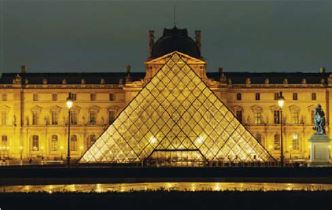
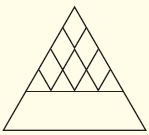
Question 10.
Describe the quadrilaterals you see in the diagram.
_________
_________
Answer:
Trapezoid and Rhombus
Explanation:
There are 2 quadrilaterals available in the given image. One is Trapezoid with 1 pair of parallel sides. Another one is Rhombus is with 2 pairs of parallel sides and 4 sides of equal lengths, and 0 right angles.
Question 11.
How many triangles do you see in the diagram? Explain.
______ triangles
Answer:
11 triangles
Explanation:
The given image has 11 triangles
Common Core – New – Page No. 571
Classify Quadrilaterals
Classify each figure as many ways as possible. Write quadrilateral, trapezoid, parallelogram, rhombus, rectangle, or square.
Question 1.
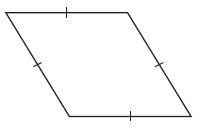
Think: 2 pairs of parallel sides
4 sides of equal length
0 right angles
quadrilateral, parallelogram, rhombus
Answer:
Quadrilateral, Parallelogram, and rhombus.
Explanation:
2 pairs of parallel sides
4 sides of equal length
0 right angles
Quadrilateral, Parallelogram, and rhombus.
Question 2.

Type below:
_________
Answer:
Quadrilateral, Parallelogram, Rectangle
Explanation:
2 pairs of parallel sides
2 pairs of sides of equal length
4 right angles
Quadrilateral, Parallelogram, Rectangle
Question 3.

Type below:
_________
Answer:
Explanation:
1 pair of parallel sides
2 sides of equal length
0 right angles
Quadrilateral, Trapezoid
Question 4.
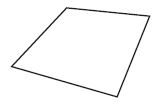
Type below:
_________
Answer:
Quadrilateral
Explanation:
0 pair of parallel sides
0 sides of equal length
0 right angles
Quadrilateral
Question 5.

Type below:
_________
Answer:
Quadrilateral, Parallelogram, and rhombus
Explanation:
2 pairs of parallel sides
4 sides of equal length
0 right angles
Quadrilateral, Parallelogram, and rhombus
Question 6.
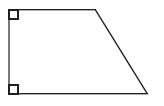
Type below:
_________
Answer:
Explanation:
1 pair of parallel sides
0 sides of equal length
2 right angles
Quadrilateral, Trapezoid
Question 7.
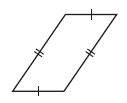
Type below:
_________
Answer:
Explanation:
2 pairs of parallel sides
2 pairs of sides of equal length
0 right angles
Quadrilateral, Parallelogram
Problem Solving
Question 8.
Alan drew a polygon with four sides and four angles. All four sides are equal. None of the angles are right angles. What figure did Alan draw
_________
Answer:
Quadrilateral or rhombus
Explanation:
Alan drew a polygon with four sides and four angles. All four sides are equal. None of the angles are right angles. Alan drew Quadrilateral or rhombus
Question 9.
Teresa drew a quadrilateral with 2 pairs of parallel sides and 4 right angles. What quadrilateral could she have drawn?
_________
Answer:
square or rectangle
Explanation:
2 pairs of parallel sides and 4 right angles. she could draw a square or rectangle.
Common Core – New – Page No. 572
Lesson Check
Question 1.
Joey is asked to name a quadrilateral that is also a rhombus. What should be his answer?
Options:
a. square
b. rectangle
c. parallelogram
d. trapezoid
Answer:
a. square
Explanation:
The quadrilateral square is also called a rhombus. Both square and rhombus have 2 pairs of parallel sides and 4 sides of equal length.
Question 2.
Which quadrilateral has exactly one pair of parallel sides?
Options:
a. square
b. rhombus
c. parallelogram
d. trapezoid
Answer:
d. trapezoid
Explanation:
A trapezoid has exactly one pair of parallel sides.
Spiral Review
Question 3.
Terrence has 24 eggs to divide into equal groups. What are all the possible numbers of eggs that Terence could put in each group?
Options:
a. 1, 2, 3, 4
b. 2, 4, 6, 8, 12
c. 1, 2, 3, 4, 6, 8, 12, 24
d. 24, 48, 72, 96
Answer:
c. 1, 2, 3, 4, 6, 8, 12, 24
Explanation:
Terrence has 24 eggs to divide into equal groups. Terence could put in each group in 1, 2, 3, 4, 6, 8, 12, 24 ways.
Question 4.
In a line of students, Jenna is number 8. The teacher says that a rule for a number pattern is add 4. The first student in line says the first term, 7. What number
should Jenna say?
Options:
a. 31
b. 35
c. 39
d. 43
Answer:
b. 35
Explanation:
In a line of students, Jenna is number 8. The teacher says that a rule for a number pattern is add 4. The first student in line says the first term, 7.
7 + 4 = 11
11 + 4 = 15
15 + 4 = 19
19 + 4 = 23
23 + 4 = 27
27 + 4 = 31
31 + 4 = 35.
Jenna says 35.
Question 5.
Lou eats \(\frac{6}{8}\) of a pizza. What fraction of the pizza is left over?
Options:
a. \(\frac{1}{8}\)
b. \(\frac{1}{4}\)
c. \(\frac{1}{2}\)
d. \(\frac{3}{4}\)
Answer:
b. \(\frac{1}{4}\)
Explanation:
Lou eats \(\frac{6}{8}\) of a pizza. So, 6 parts of pizza is finished and remaining 2 parts of pizza is remained. So, the left over pizza is \(\frac{2}{8}\) = \(\frac{1}{4}\).
Question 6.
Which capital letter appears to have parallel lines?
Options:
a. D
b. L
c. N
d. T
Answer:
c. N
Explanation:
N has two parallel lines and never intersect each other.
Page No. 573
Choose the best term from the box to complete the sentence.
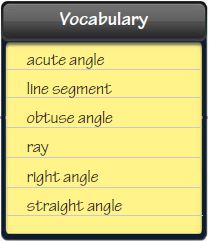
Question 1.
A _______ is part of a line between two endpoints.
_________
Answer:
line segment
Question 2.
A _______ forms a square corner.
_________
Answer:
Right angle
Question 3.
An _______ is greater than a right angle and less than a straight angle.
_________
Answer:
Obtuse angle
Question 4.
The two-dimensional figure that has one endpoint is a ________.
_________
Answer:
ray
Question 5.
An angle that forms a line is called a _______.
_________
Answer:
straight line
Question 6.
On the grid below, draw a polygon that has 2 pairs of parallel sides, 2 pairs of sides equal in length, and 2 acute and 2 obtuse angles. Tell all the possible names for the figure.
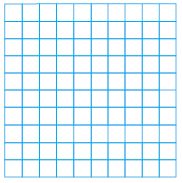
Type below:
_________
Answer:
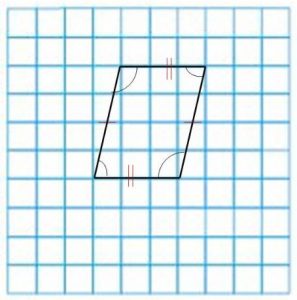
Parallelogram
Explanation:
The possible polygon that has 2 pairs of parallel sides, 2 pairs of sides equal in length, and 2 acute and 2 obtuse angles is Parallelogram.
Draw the figure.
Question 7.
parallel lines
Type below:
_________
Answer:

Explanation:
QR and ST are two parallel lines. they never intersect each other.
Question 8.
obtuse ∠ABC
Type below:
_________
Answer:

Explanation:
From triangle, ABC, Angle A, and Angle C are both acute with less than a right angle. Angle B is an obtuse angle that is greater than a right angle.
Question 9.
intersecting lines that are not perpendicular
Type below:
_________
Answer:

Explanation:
ST and UV are two lines intersecting at point X.
Question 10.
acute ∠RST
Type below:
_________
Answer:
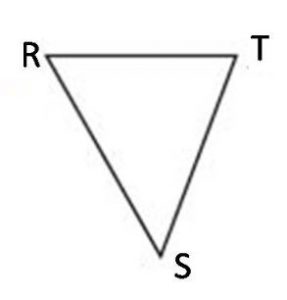
Page No. 574
Question 11.
Which triangle has one right angle?
_________
Answer:
A right triangle has one right angle.
Question 12.
Which figure has 2 pairs of parallel sides, 2 pairs of sides of equal length, and 4 right angles?
_________
Answer:
A Rectangle has 2 pairs of parallel sides, 2 pairs of sides of equal length, and 4 right angles.
Question 13.
Which quadrilateral can have 2 pairs of parallel sides, all sides with equal length, and no right angles?
_________
Answer:
Rhombus can have 2 pairs of parallel sides, all sides with equal length, and no right angles.
Question 14.
What is the correct name of the figure shown?
![]()
_________
Answer:
Ray
Explanation:
EF is a ray that has one endpoint and continues without an end in one direction.
Question 15.
Describe the angles of an obtuse triangle.
Type below:
_________
Answer:
An obtuse triangle (or obtuse-angled triangle) is a triangle with one obtuse angle (greater than 90°) and two acute angles.
Page No. 577
Tell whether the parts on each side of the line match. Is the line a line of symmetry? Write yes or no.
Question 1.

____
Answer:
Yes;
Explanation:
The line of symmetry divides a shape into two parts that are the same size and shape.
Question 2.

____
Answer:
Yes;
Explanation:
The line of symmetry divides a shape into two parts that are the same size and shape.
Question 3.

____
Answer:
Yes;
Explanation:
The line of symmetry divides a shape into two parts that are the same size and shape.
Question 4.

____
Answer:
No;
Explanation:
The line of symmetry divides a shape into two parts that are not with the same size and shape.
Tell if the blue line appears to be a line of symmetry. Write yes or no.
Question 5.

____
Answer:
Yes;
Explanation:
The line of symmetry divides a shape into two parts that are the same size and shape.
Question 6.
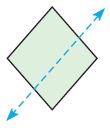
____
Answer:
No;
Explanation:
The line of symmetry divides a shape into two parts that are not with the same size and shape.
Question 7.
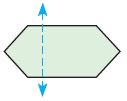
____
Answer:
No;
Explanation:
The line of symmetry divides a shape into two parts that are not with the same size and shape.
Question 8.

____
Answer:
Yes;
Explanation:
The line of symmetry divides a shape into two parts that are the same size and shape.
Tell if the blue line appears to be a line of symmetry. Write yes or no.
Question 9.
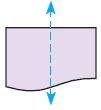
____
Answer:
No;
Explanation:
The line of symmetry divides a shape into two parts that are not with the same size and shape.
Question 10.

____
Answer:
Yes;
Explanation:
The line of symmetry divides a shape into two parts that are the same size and shape.
Question 11.
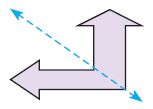
____
Answer:
No;
Explanation:
The line of symmetry divides a shape into two parts that are not with the same size and shape.
Question 12.
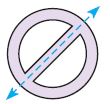
____
Answer:
Yes;
Explanation:
The line of symmetry divides a shape into two parts that are the same size and shape.
Question 13.
Which best describes the symmetry in the letter I?
![]()
Type below:
________
Answer:
The two parts of the folded I match exactly. The fold line is a line of symmetry.
Explanation:
Take the Horizontal line in the middle of the Letter I. Cut out the tracing. Fold the tracing over a horizontal line. The two parts of the folded I match exactly. The fold line is a line of symmetry.
Page No. 578
Question 14.
Which shape has a correctly drawn line of symmetry?


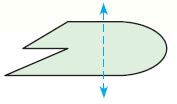

a. What do you need to find?
Type below:
________
Answer:
Find the shape that has an exact line of symmetry.
Question 14.
b. How can you tell if the line of symmetry is correct?
Type below:
________
Answer:
If the two parts of the folded match exactly, then the line is a line of symmetry.
Question 14.
c. Tell how you solved the problem.
Type below:
________
Answer:
From fig 1 to 4, the fig 2 is has a line of symmetry that can exactly separate the two parts equally.
Question 14.
d. Circle the correct shape above.
Type below:
________
Answer:

Question 15.
Reason Abstractly Draw a line of symmetry in the figure shown.
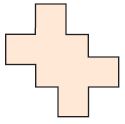
Answer:
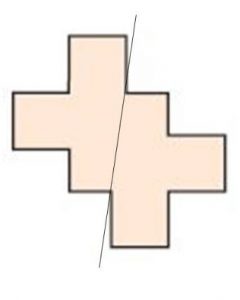
Question 16.
Evie’s birthday is on the 18th of May. Since May is the 5th month, Evie wrote the date as shown.

Evie says all the numbers she wrote have line symmetry. Is she correct? Explain.
Answer:
No; The number 5 doesn’t have a line of symmetry. So, Evie explanation is wrong.
Common Core – New – Page No. 579
Line Symmetry
Tell if the dashed line appears to be a line of symmetry. Write yes or no.
Question 1.

yes
Answer:
Yes;
Explanation:
The line of symmetry divides a shape into two parts that are the same size and shape.
Question 2.
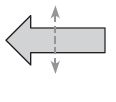
____
Answer:
No;
Explanation:
The line of symmetry divides a shape into two parts that are not with the same size and shape.
Question 3.
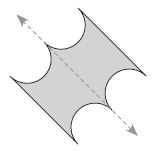
____
Answer:
Yes;
Explanation:
The line of symmetry divides a shape into two parts that are the same size and shape.
Question 4.

____
Answer:
No;
Explanation:
The line of symmetry divides a shape into two parts that are not with the same size and shape.
Question 5.

____
Answer:
No;
Explanation:
The line of symmetry divides a shape into two parts that are not with the same size and shape.
Question 6.
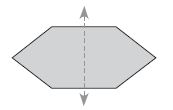
____
Answer:
Yes;
Explanation:
The line of symmetry divides a shape into two parts that are the same size and shape.
Question 7.
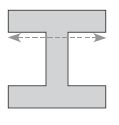
____
Answer:
No;
Explanation:
The line of symmetry divides a shape into two parts that are not with the same size and shape.
Question 8.
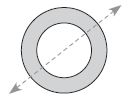
____
Answer:
Yes;
Explanation:
The line of symmetry divides a shape into two parts that are the same size and shape.
Complete the design by reflecting over the line of symmetry.
Question 9.
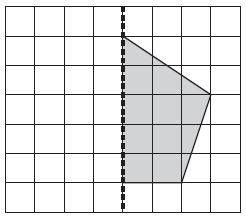
Answer:
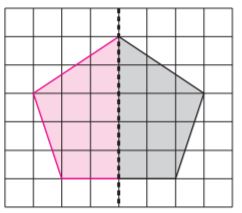
Question 10.
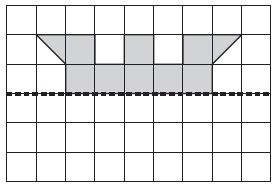
Answer:
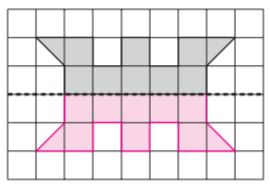
Problem Solving
Question 11.
Kara uses the pattern below to make paper dolls. The dashed line represents a line of symmetry. A complete doll includes the reflection of the pattern over the line of symmetry. Complete the design to show what one of Kara’s paper dolls looks like.
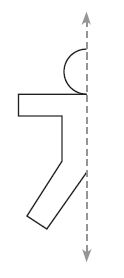
Answer:
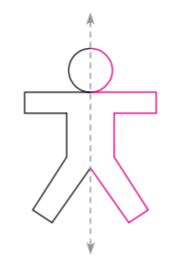
Common Core – New – Page No. 580
Lesson Check
Question 1.
Which best describes the line of symmetry in the letter D?

Options:
a. horizontal
b. vertical
c. diagonal
d. half turn
Answer:
a. horizontal
Explanation:
The horizontal line of symmetry in the letter D can exactly separate two parts equally.
Question 2.
Which shape has a correctly drawn line of symmetry?
Options:
a. 
b. 
c. 
d. 
Answer:
b. 
Explanation:
Image b has the line of symmetry that separates two parts equally.
Spiral Review
Question 3.
The class has 360 unit cubes in a bag. Johnnie divides the unit cubes equally among 8 groups. How many unit cubes will each group get?
Options:
a. 40
b. 44
c. 45
d. 48
Answer:
c. 45
Explanation:
The class has 360 unit cubes in a bag. Johnnie divides the unit cubes equally among 8 groups. 360/8= 45.
Question 4.
There are 5,280 feet in one mile. How many feet are there in 6 miles?
Options:
a. 30,680
b. 31,260
c. 31,608
d. 31,680
Answer:
d. 31,680
Explanation:
There are 5,280 feet in one mile. So, for 6 miles = 6 x 5, 280 = 31,680.
Question 5.
Sue has 4 pieces of wood. The lengths of her pieces of wood are \(\frac{1}{3}\) foot, \(\frac{2}{5}\) foot, \(\frac{3}{10}\) foot, and \(\frac{1}{4}\) foot. Which piece of wood is the shortest?
Options:
a. the \(\frac{1}{3}\) foot piece
b. the \(\frac{2}{5}\) foot piece
c. the \(\frac{3}{10}\) foot piece
d. the \(\frac{1}{4}\) foot piece
Answer:
d. the \(\frac{1}{4}\) foot piece
Explanation:
The lengths of \(\frac{1}{4}\) foot piece is less compared to other lengths.
Question 6.
Alice has \(\frac{1}{5}\) as many miniature cars as Sylvester has. Sylvester has 35 miniature cars. How many miniature cars does Alice have?
Options:
a. 7
b. 9
c. 40
d. 175
Answer:
a. 7
Explanation:
Alice has \(\frac{1}{5}\) as many miniature cars as Sylvester has. Sylvester has 35 miniature cars. Alice have \(\frac{1}{5}\) X 35 = 7 miniature cars.
Page No. 583
Question 1.
The shape at the right has line symmetry. Draw the 2 lines of symmetry.
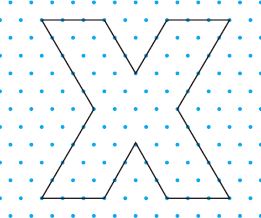
Type below:
_________
Answer:
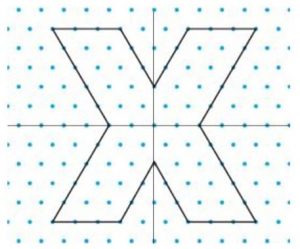
Tell whether the shape appears to have zero lines, 1 line, or more than 1 line of symmetry. Write zero, 1, or more than 1.
Question 2.
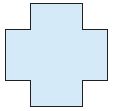
_________
Answer:
more than 1
Explanation:
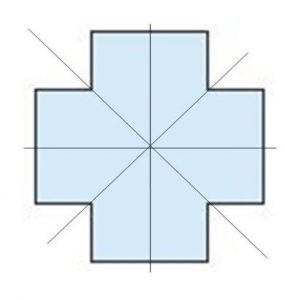
There is more than 1 line of symmetries that separates two parts equally.
Question 3.
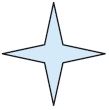
_________
Answer:
more than 1
Explanation:
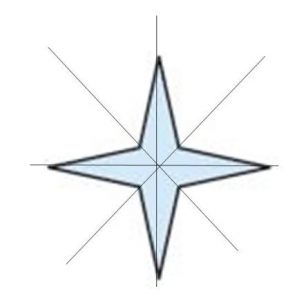
There is more than 1 lines of symmetries that separates two parts equally.
Question 4.
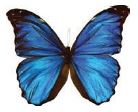
_________
Answer:
1 line
Explanation:
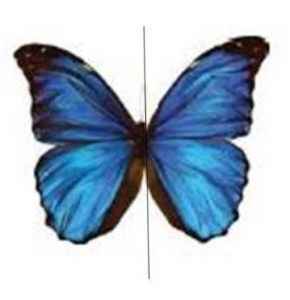
There is 1 line of symmetry that separates two parts equally.
Question 5.
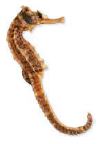
_________
Answer:
zero lines
Explanation:
There is no line of symmetries that separates two parts equally.
Tell whether the shape appears to have zero lines, 1 line, or more than 1 line of symmetry. Write zero, 1, or more than 1.
Question 6.

_________
Answer:
more than 1
Explanation:
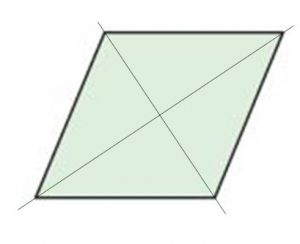
There is more than 1 lines of symmetries that separate two parts equally.
Question 7.

_________
Answer:
zero lines
Explanation:
There is no line of symmetries that separates two parts equally.
Question 8.
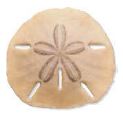
_________
Answer:
zero lines
Explanation:
There is no line of symmetries that separates two parts equally.
Question 9.

_________
Answer:
1 line
Explanation:
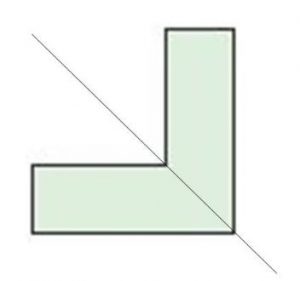
There is 1 line of symmetry that separates two parts equally.
Practice: Copy and Solve Does the design have line symmetry?
Write yes or no. If your answer is yes, draw all lines of symmetry.
Question 10.
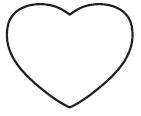
____
Answer:
Yes;
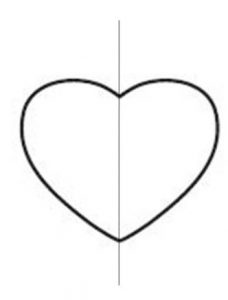
Question 11.

_____
Answer:
No;
Question 12.

_____
Answer:
Yes;
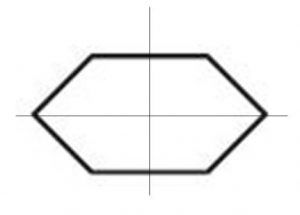
Question 13.

_____
Answer:
No;
Question 14.
Draw a figure that has 5 sides and exactly 1 line of symmetry.
Type below:
_________
Answer:
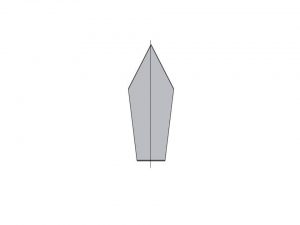
Explanation:
the above 5 sides shape has only 1 line symmetry
Page No. 584
Use the chart for 15–17.
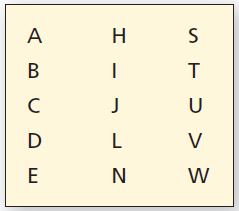
Question 15.
Which letters appear to have only 1 line of symmetry?
Type below:
_________
Answer:
A, B, C, D, E, T, U, V, W
Explanation:
The letters A, B, C, D, E, T, U, V, W have only 1 line of symmetry.
Question 16.
Which letters appear to have zero lines of symmetry?
Type below:
_________
Answer:
J, N, S
Explanation:
The letters J, N, S have only zero lines of symmetry.
Question 17.
The letter C has horizontal symmetry. The letter A has vertical symmetry. Which letters appear to have both horizontal and vertical symmetry?
Type below:
_________
Answer:
H and I
Explanation:
The letters H and I have both horizontal and vertical symmetry.
Question 18.
Verify the Reasoning of Others Jeff says that the shape has only 2 lines of symmetry.
Does his statement make sense? Explain.

Type below:
_________
Answer:
No; Jeff’s explanation is wrong. Because the given shape has only 2 lines of symmetry.
Question 19.
Match each figure with the correct number of lines of symmetry it has.

Type below:
_________
Answer:
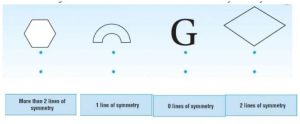
Common Core – New – Page No. 585
Find and Draw Lines of Symmetry
Tell whether the shape appears to have zero lines, 1 line, or more than 1 line of symmetry. Write zero, 1, or more than 1.
Question 1.
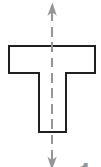
1
Answer:
more than 1
Explanation:
There is more than 1 line of symmetry that separates two parts equally.
Question 2.
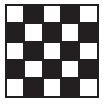
________
Answer:
more than 1
Explanation:
There is more than 1 line of symmetry that separates two parts equally.
Question 3.

________
Answer:
Zero
Explanation:
There are 0 lines of symmetries.
Question 4.
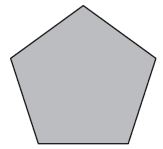
________
Answer:
more than 1
Explanation:
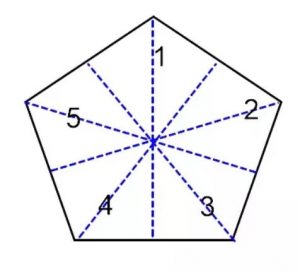
There is more than 1 line of symmetry that separates two parts equally.
Does the design have line symmetry? Write yes or no.
If your answer is yes, draw all lines of symmetry.
Question 5.

_____
Answer:
Yes;
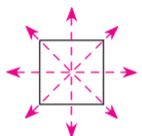
Question 6.

_____
Answer:
Yes;
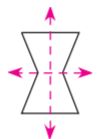
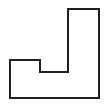
_____
Answer:
No;
Question 8.
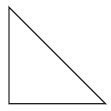
______
Answer:
Yes;
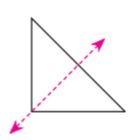
Draw a shape for the statement. Draw the line or lines of symmetry.
Question 9.
zero lines of symmetry
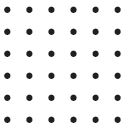
Answer:
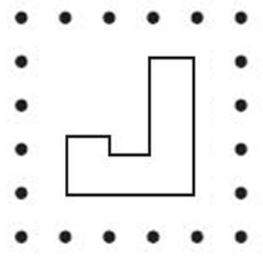
Question 10.
1 line of symmetry
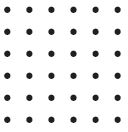
Answer:
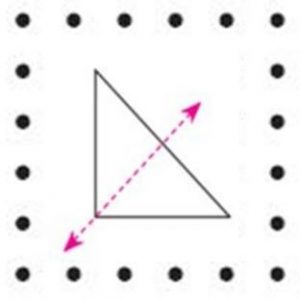
Question 11.
2 lines of symmetry
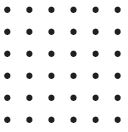
Answer:
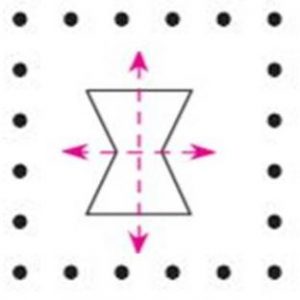
Problem Solving
Use the chart for 12–13.
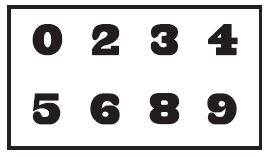
Question 12.
Which number or numbers appear to have only 1 line of symmetry?
_____
Answer:
3
Explanation:
The number 3 has only 1 line of symmetry.
Question 13.
Which number or numbers appear to have 2 lines of symmetry?
_____
Answer:
0 and 8
Explanation:
The numbers 0 and 8 appear to have 2 lines of symmetry.
Common Core – New – Page No. 586
Lesson Check
Question 1.
How many lines of symmetry does this shape appear to have?
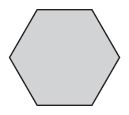
Options:
a. 0
b. 2
c. 6
d. 12
Answer:
c. 6
Explanation:
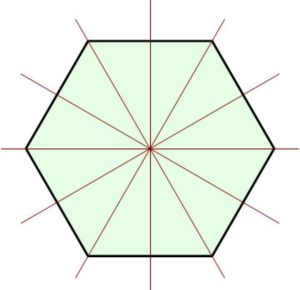
The given shape has 6 lines of symmetries.
Question 2.
Which of the following shapes appears to have exactly 1 line of symmetry?
Options:
a. 
b.
c. 
d. ![]()
Answer:
d. ![]()
Explanation:
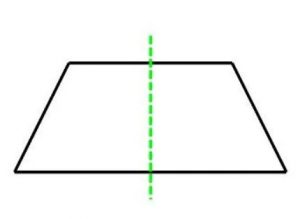
The trapezoid has exactly 1 line of symmetry.
Spiral Review
Question 3.
Richard practiced each of 3 piano solos for \(\frac{5}{12}\) hour. How long did he practice in all?
Options:
a. \(\frac{2}{3}\) hours
b. 1 \(\frac{1}{4}\) hours
c. 1 \(\frac{1}{3}\) hours
d. 1 \(\frac{5}{12}\) hours
Answer:
b. 1 \(\frac{1}{4}\) hours
Explanation:
Richard practiced each of 3 piano solos for \(\frac{5}{12}\) hour. \(\frac{5}{12}\) hour = 1 \(\frac{1}{4}\) hours hours.
Question 4.
Which of the following decimals is equivalent to three and ten hundredths?
Options:
a. 0.30
b. 0.31
c. 3.01
d. 3.1
Answer:
d. 3.1
Explanation:
three and ten hundredths = 310 hundredths = 3.1
Question 5.
Lynne used \(\frac{3}{8}\) cup of flour and \(\frac{1}{3}\) cup of sugar in a recipe. Which number below is a common denominator for \(\frac{3}{8}\) and \(\frac{1}{3}\)?
Options:
a. 8
b. 12
c. 16
d. 24
Answer:
d. 24
Explanation:
Lynne used \(\frac{3}{8}\) cup of flour and \(\frac{1}{3}\) cup of sugar in a recipe. To find the common denominator for \(\frac{3}{8}\) and \(\frac{1}{3}\), multiply 8 X3 and 3 X 8 = 24.
Question 6.
Kevin draws a figure that has four sides. All sides have the same length. His figure has no right angles. What figure does Kevin draw?
Options:
a. square
b. trapezoid
c. rhombus
d. rectangle
Answer:
c. rhombus
Explanation:
Page No. 589
Question 1.
Marisol is making a pattern with blocks. What might the missing shape be?
First, look at the blocks.

Next, describe the pattern.
Type below:
_________
Answer:
The first image 1 has three line segments. The next shape will have four line segments.
Question 1.
Finally, draw the missing shape.

Type below:
_________
Answer:
![]()
Question 2.
Use the shapes to write a number pattern. Then describe the pattern in the numbers.
Answer:

Shape 1: Triangle
Shape 2: Square
Shape 3: Pentagon
Shape 4: Hexagon
Shape 5: Heptagon
Question 3.
What if the pattern continued? Write an expression to describe the number of sides the sixth shape has in Marisol’s pattern.
Type below:
_________
Answer:
If the pattern continued, then the next shape will have one more extra line segment to it. The sixth shape will become the octagon.
Shape 6: Octagon
Question 4.
Sahil made a pattern using circles. The first nine circles are shown. Describe the pattern. If Sahil continues the pattern, what might the next three circles be?

Type below:
_________
Answer:
The pattern is repeated for every three circles. One big circle followed by two small circles.

Page No. 590
Use the toy quilt designs for 5–6.
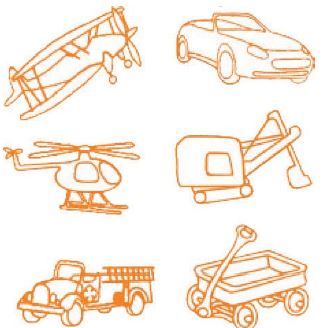
Question 5.
Lu is making a quilt that is 20 squares wide and has 24 rows. The border of the quilt is made by using each toy design equally as often. Each square can hold one design. How many of each design does she use for the border?
______ times
Answer:
The border will have 20 squares two times, and 24 squares two times as well, that is the perimeter or the border, because a quilt has 4 sides:
20 X 2 + 24 X 2 = 40 + 48 = 88
So, the border will have 88 squares in total. So if the border can have only one design, Lu can use any toy design 88 times if she wants the border to have the same toy design in it.
Question 6.
Communicate Starting in the first square of her quilt, Lu lined up her toy designs in this order: plane, car, fire truck, helicopter, crane, and wagon. Using this pattern unit, which design will Lu place in the fifteenth square? Explain how you found your answer.
_________
Answer:
The answer is fire truck. As the pattern repeats, the fifteenth square will fire truck.
Question 7.
Missy uses 1 hexagonal, 2 rectangular, and 4 triangular pieces of fabric to make 1 bug design for a quilt. If she uses 70 pieces in all to make bug designs, how many of each shape does she use?
Hexagonal: _________ shapes
Rectangular: _________ shapes
Triangular: _________ shapes
Answer:
Hexagonal: 10 shapes
Rectangular: 10 shapes
Triangular: 10 shapes
(1 x 10) + (2 x 10) + (4 x 10) = 10 + 20 + 40 = 70 pieces in all.
Question 8.
Norris drew the pattern shown.

Label the circles to show the colors in the fourth figure of the pattern.
Type below:
_________
Answer:
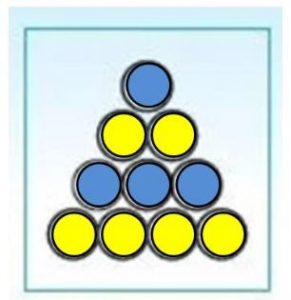
Common Core – New – Page No. 591
Problem Solving Shape Patterns
Solve each Problem.
Question 1.
Marta is using this pattern to decorate a picture frame. Describe the pattern. Draw what might be the next three figures in the pattern.
![]()
Possible answer: the pattern repeats: one trangle followed by two squares.
Answer:
![]()
The pattern repeats one triangle followed by two squares.
Question 2.
Describe the pattern. Draw what might be the next three figures in the pattern. How many circles are in the sixth figure in the pattern?

_____ circles
Answer:

Add one more column with 1 more circle than in the previous column; 21.
Question 3.
Larry stencils this pattern to make a border at the top of his bedroom walls. Describe the pattern. Draw what might be the missing figure in the pattern.

Answer:
![]()
2 triangles placed side to side followed by 2 sets of 2 triangles placed vertex to vertex
Common Core – New – Page No. 592
Lesson Check
Question 1.
What might be the next three figures in this pattern?
![]()
Options:
a. ![]()
b. ![]()
c. ![]()
d. ![]()
Answer:
a. ![]()
Explanation:
the pattern has odd numbers of up arrows then even number of down arrows. So, the next three figures are ![]() .
.
Question 2.
Which might be the missing figure in the following pattern?

Options:
a. ![]()
b. ![]()
c. ![]()
d. ![]()
Answer:
a. ![]()
Explanation:
From the pattern, the missing image will have vertical rectangle with the circle and X mark in it.
Spiral Review
Question 3.
Chad has two pieces of wood. One piece is \(\frac{7}{12}\) foot long. The second piece is \(\frac{5}{12}\) foot longer than the first piece. How long is the second piece?
Options:
a. \(\frac{2}{12}\) foot
b. \(\frac{1}{2}\) foot
c. \(\frac{12}{18}\) foot
d. 1 foot
Answer:
d. 1 foot
Explanation:
\(\frac{7}{12}\) + \(\frac{5}{12}\) = \(\frac{12}{12}\) = 1 foot.
Question 4.
Olivia finished a race in 40.64 seconds. Patty finished the race in 40.39 seconds. Miguel finished the race in 41.44 seconds. Chad finished the race in 40.46 seconds. Who finished the race in the least time?
Options:
a. Olivia
b. Patty
c. Miguel
d. Chad
Answer:
b. Patty
Explanation:
Patty finished the race in 40.39 seconds that is the least time compared to others.
Question 5.
Justin bought 6 ribbons for an art project. Each ribbon is \(\frac{1}{4}\) yard long. How many yards of ribbon did Justin buy?
Options:
a. \(\frac{2}{3}\) yard
b. 1 \(\frac{1}{4}\) yards
c. 1 \(\frac{1}{2}\) yards
d. 1 \(\frac{3}{4}\) yards
Answer:
c. 1 \(\frac{1}{2}\) yards
Explanation:
Justin bought 6 ribbons for an art project. Each ribbon is \(\frac{1}{4}\) yard long. So, 6 X \(\frac{1}{4}\) = \(\frac{3}{2}\) = 1 \(\frac{1}{2}\) yards.
Question 6.
Kyle and Andrea were asked to make a list of prime numbers.
Kyle: 1, 3, 7, 19, 23
Andrea: 2, 3, 5, 7, 11
Whose list is correct?
Options:
a. Only Kyle’s list
b. Only Andrea’s list
c. Both lists are correct.
d. Neither list is correct.
Answer:
b. Only Andrea’s list
Explanation:
1 is not a prime number. So, the answer is Only Andrea’s list is correct.
Page No. 593
Question 1.
Gavin is designing a kite. He sketched a picture of the kite.
How many right angles does the kite appear to have?
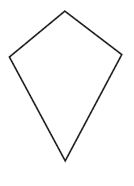
_____ right angles
Answer:
0 right angles
Explanation:
There is no right angles in the given shape.
Question 2.
Write the letter of the triangle under its correct classification.
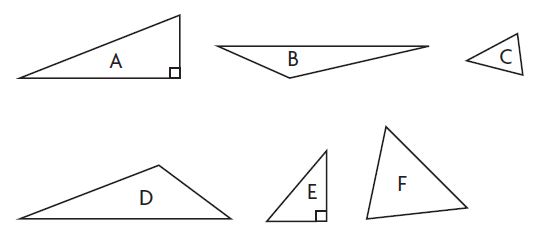

Answer:

Explanation:
C and F are Acute angles with less than right angles.
B and D are Obtuse Angles with more than right angles.
A and E are Right Angles.
Question 3.
Select the angles that identify an obtuse triangle. Mark all that apply.
Options:
a. acute, acute, acute
b. acute, acute, obtuse
c. right, acute, acute
d. obtuse, right, acute
Answer:
b. acute, acute, obtuse
Explanation:
An obtuse triangle will have one obtuse angle and two acute angles.
Page No. 594
Question 4.
Write the word that describes the part of Figure A written below.
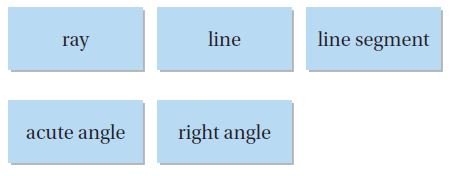
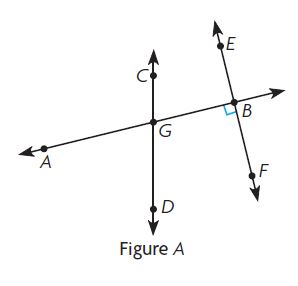
\(\overline{E B}\) _________
\(\overset { \longleftrightarrow }{ AB } \) _________
\(\overrightarrow{G A}\) _________
∠EBG _________
∠CGB _________
Answer:
\(\overline{E B}\) line segment.
\(\overset { \longleftrightarrow }{ AB } \) Line.
\(\overrightarrow{G A}\) Ray.
∠EBG right angle.
∠CGB acute angle.
Explanation:
\(\overline{E B}\) is a line segment that has two endpoints connected to form a line.
\(\overset { \longleftrightarrow }{ AB } \) is a Line that continues without an end in both directions.
\(\overrightarrow{G A}\) is a Ray that has one endpoint and continues without an end in one direction.
∠EBG right angle.
∠CGB is an acute angle with less than the right angle.
Question 5.
What term best describes the figure shown below?
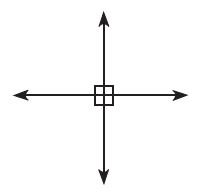
Answer:
perpendicular lines
Explanation:
The lines are forming four right angles they form squares. So, the both lines are perpendicular lines.
Question 6.
Naomi leaves for her trip to Los Angeles on the 12th day of August. Since August is the 8th month, Naomi wrote the date as shown.
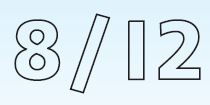
Naomi says all the numbers she wrote have line symmetry. Is she correct? Explain your thinking.
_______
Answer:
Naomi is incorrect. The number 2 does not have a line of symmetry because if it were cut out, there would be no way to fold it in half so that the two parts matched exactly.
Page No. 595
Question 7.
Max made a pennant that looks like a triangle. How can you classify the triangle based upon its angles?

The triangle is a(n) ____________ triangle.
Answer:
The triangle is an acute triangle.
Explanation:
The triangle is an acute triangle. because it has angles with less than right angles.
Question 8.
Choose the labels to make a true statement.
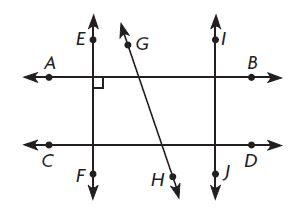
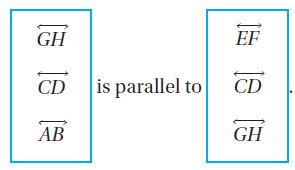
_____ is parallel to ______
Answer:
Line AB is parallel to line CD.
Explanation:
From the given image, Line AB is parallel to line CD.
Question 9.
Classify the figure. Select all that apply.

Options:
a. quadrilateral
b. trapezoid
c. parallelogram
d. rectangle
e. rhombus
f. square
Answer:
a. quadrilateral
b. trapezoid
c. parallelogram
d. rectangle
Explanation:
The given image has 2 parallel sides, 2 pairs of sides of length, and four right angles. So, the possible answers are quadrilateral, trapezoid, parallelogram, and rectangle.
Question 10.
Lily designed a deck in her backyard that looks like a quadrilateral that has only 1 pair of parallel sides. How can you classify the figure?
The quadrilateral is a ________
Answer:
The quadrilateral is a trapezoid
Explanation:
Lily designed a deck in her backyard that looks like a quadrilateral that has only 1 pair of parallel sides. So, the answer is a trapezoid.
Page No. 596
Question 11.
Match each figure with the correct number of lines of symmetry it has.

Answer:
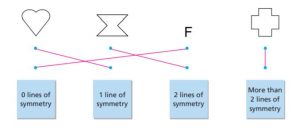
Explanation:
Image 1: 1 line of symmetry
Image 2: 2 lines of symmetry
Image 3: 0 lines of symmetry
Image 4: More than 2 lines of symmetry.
Question 12.
Barb drew the pattern shown.

Use the square shown to draw the missing pattern. □
Answer:

Explanation:
The fourth shape must consist of one extra square box in the top line and bottom line.
Question 13.
Claudia drew the figure below. Draw a line of symmetry on Claudia’s figure.

Answer:

Explanation:
The image can have one line symmetry.
Question 14.
Write the word or words that best describe this figure.
![]()
_________
Answer:
Ray
Explanation:
The ray that has one endpoint and continues without an end in one direction.
Question 15.
How many acute angles does a right triangle have?
A right triangle has ____ acute angles.
Answer:
A right triangle has 2 acute angles.
Page No. 597
Question 16.
Mike drew a figure with opposite sides parallel. Write the pairs of parallel sides. What figure is it?
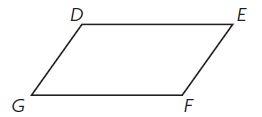
Answer:
Line DG is parallel to Line FE and Line DE is parallel to Line GF; the figure is a parallelogram.
Question 17.
Circle the letter that does not have line symmetry.

Answer:

Explanation:
The S does not have line symmetry.
Question 18.
Joseph made a pattern using ovals and rectangles. The first four figures of his pattern are shown. Draw the next figure in the pattern.

Answer:

Question 19.
Jeremy drew Figure 1 and Louisa drew Figure 2.
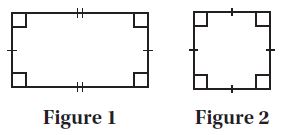
Part A
Jeremy says both figures are rectangles. Do you agree with Jeremy?
Support your answer.
_____
Answer:
Yes; both figures have 2 pairs of parallel sides, opposite sides that are equal in length, and 4 right angles.
Question 19.
Part B
Louisa says both figures are rhombuses. Do you agree with Louisa?
Support your answer.
_____
Answer:
No; figure 2 is a rhombus since it has 2 pairs of parallel sides and 4 sides of equal length. Figure 1 does not have 4 sides of equal length so it cannot be a rhombus.
Page No. 598
Question 20.
Veronica found the number of lines of symmetry for the figure below. How many lines of symmetry does it have?
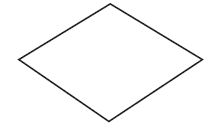
______ lines of symmetry
Answer:
2 lines of symmetry
Explanation:
the given shape can have 2 lines of symmetry.
Question 21.
Jordan drew the pattern below.

Part A
Describe the pattern.
Answer:
Each figure has 2 more squares than the preceding figure.
Question 21.
Part B
Write a rule using numbers to find the number of squares in any figure in the pattern.
Answer:
multiply the figure number by 2.
Question 21.
Part C
Draw Figure 5.
Answer:

Page No. 603
Tell what fraction of the circle the shaded angle represents.
Question 1.
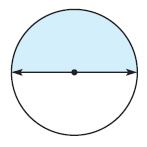
\(\frac{□}{□}\)
Answer:
\(\frac{1}{2}\)
Explanation:
Half of the part is shaded out of the circle. So, the answer is 1/2.
Question 2.
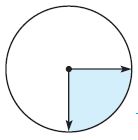
\(\frac{□}{□}\)
Answer:
\(\frac{1}{4}\)
Explanation:
\(\frac{1}{4}\) part of the circle is shaded out of the circle.
Question 3.
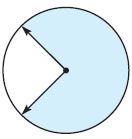
\(\frac{□}{□}\)
Answer:
\(\frac{3}{4}\)
Explanation:
3 parts of the circle is shaded out of the circle
Question 4.
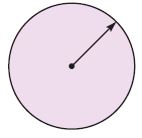
\(\frac{□}{□}\)
Answer:
\(\frac{1}{1}\) = 1
Explanation:
The complete circle is shaded. So, the answer is 1.
Question 5.
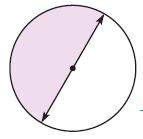
\(\frac{□}{□}\)
Answer:
\(\frac{1}{2}\)
Explanation:
Half of the part is shaded out of the circle. So, the answer is 1/2.
Question 6.
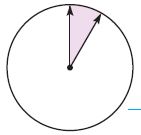
\(\frac{□}{□}\)
Answer:
\(\frac{1}{12}\)
Tell whether the angle on the circle shows a \(\frac{1}{4}, \frac{1}{2}, \frac{3}{4}\), or 1 full turn clockwise or counterclockwise.
Question 7.

Type below:
________
Answer:
\(\frac{3}{4}\); counterclockwise
Explanation:
The image shows the counterclockwise and formed the fraction of \(\frac{3}{4}\).
Question 8.

Type below:
________
Answer:
\(\frac{1}{2}\); clockwise
Explanation:
The image shows the clockwise and formed the fraction of \(\frac{1}{2}\).
Question 9.

Type below:
________
Answer:
\(\frac{1}{4}\); clockwise
Explanation:
The image shows the clockwise and formed the fraction of \(\frac{1}{4}\).
Question 10.
Susan watched the game from 1 p.m. to 1:30 p.m. Describe the turn the minute hand made.
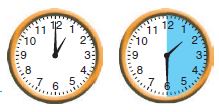
Type below:
________
Answer:
The minute hand made a \(\frac{1}{2}\) turn clockwise.
Question 11.
Compare the angles in Exercises 1 and 5. Does the position of the angle affect the size of the angle? Explain.
_____
Answer:
No; The size of the angle does not depend on the lengths of its sides.
Page No. 604
Question 12.
Malcolm drew this angle on the circle. Which of the following describes the angle? Mark all that apply.

Options:
a. \(\frac{3}{4}\) turn
b. \(\frac{1}{4}\) turn
c. clockwise
d. counterclockwise
Answer:
a. \(\frac{3}{4}\) turn
d. counterclockwise
Explanation:
The image show the \(\frac{3}{4}\) turn and also the counterclockwise.
Sense or Nonsense?
Question 13.
Whose statement makes sense? Whose statement is nonsense? Explain your reasoning.
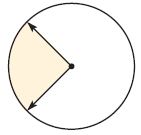
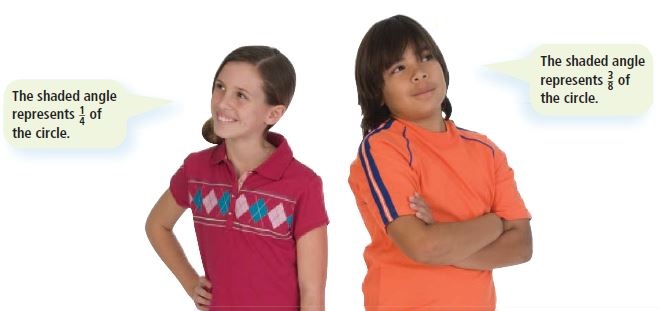
Type below:
__________
Answer:
The girl’s statement makes sense. The boy’s statement makes non-sense. Because from the figure it is clearly shown that the shaded part is \(\frac{1}{4}\) of the circle. There is no particular direction given to measure the shaded part.
Conclusion:
Increase the mathematical proficiency using Go Math Grade 4 Answer Key Chapter 10 Two-Dimensional Figures. Students can solve any type of question if they learn with the HMH Go Math Grade 4 Solution Key. Get success With Go Math Grade 4 Answer Key. We included the expertise professionals’ advice to help the students and make them a better understanding of solving problems. So, must refer to the Go Math Grade 4 Chapter 10 Answer Key and have the best practice for your career. Without any late, open Go Math Grade 4 Chapter 10 Two-Dimensional Figures Solution Key and start your practice now.
